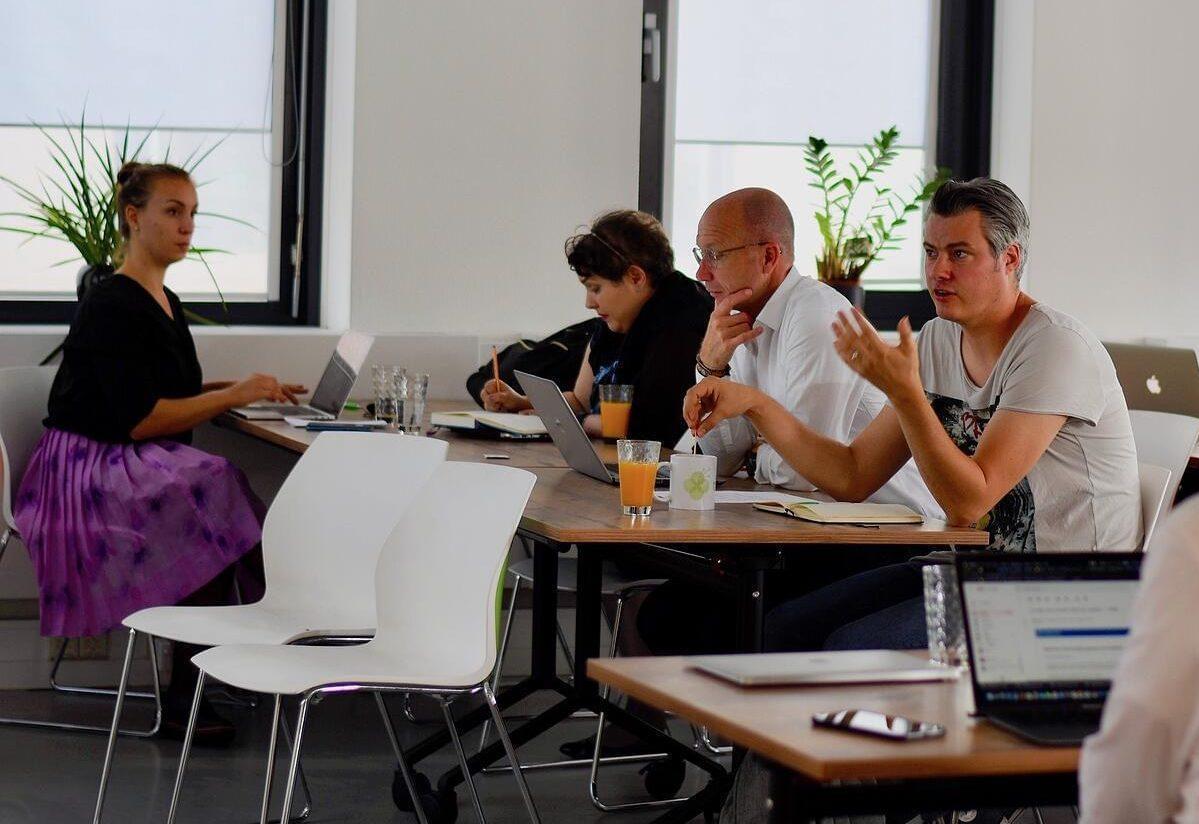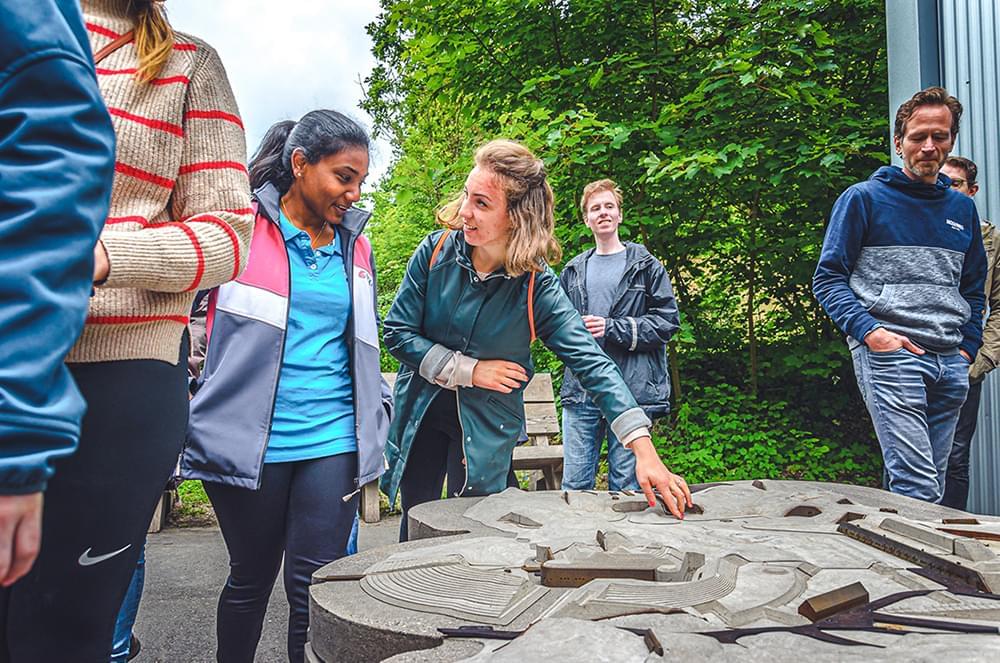Project manager Elisa Cirillo (30) is mainly running FAIR projects. After finishing her PhD in bioinformatics, she decided to join The Hyve in 2018. Initially she worked as product owner of tranSMART and Glowing Bear. When the opportunity to work as a project manager presented itself, she jumped at it. Elisa likes to devote her free time to the arts - dance, music, paintings, and literature. Ideally combining these passions with family time.

Can you tell me a bit about your background?
My university education started in Bologna, Italy, with a Bachelor in Biotechnology. It was lab-oriented work, so very practical: sequencing, recombining genes, et cetera. I did an Internship in Scotland that involved sequencing analysis in barley.
During my masters I focussed more on the pharmaceutical side of biotechnology, designing drugs with DNA-recombination and other genetic and molecular techniques. This approach also requires computational skills so it taught me about bioinformatics. I realized that I preferred this type of work over lab experiments. As much as I loved extracting DNA from cells, I didn’t see myself spending days in the lab for years to come.
It was my master thesis that brought me to the Netherlands. I was at TNO in Utrecht, a research institution where private and public parties really come together. After my masters, I decided to continue on the academic path. I looked specifically for a PhD position in the Netherlands, not only because I like the research culture here but also because I had found my future husband.
I did my PhD in bioinformatics at Maastricht University. The focus was on small genetic variants in diabetes – Single Nucleotide Polymorphisms (SNPs). This condition is really complex in the sense that there are both environmental and genetic factors at play. My job was to try and figure out which part of the genetic background of a diabetic person could predispose him or her to developing the disease.
To answer this question, I applied a technology called Network Analysis, a kind of visual way to explore genomic data. For genomic data, you can distinguish several information layers. You have for example the DNA variants, transcriptomics (gene expression levels) and you can add epigenetics information. For my doctoral studies, I tried to combine all these layers and build a network. This is how we found certain genes and variants of interest and gained more insight into the genetics behind diabetes.
During my PhD, I also developed so-called soft skills – management skills. For example, I was involved in the organization of a series of bioinformatics conferences with participants from Belgium, Germany and the Netherlands. Maastricht was an ideal location, being at the crossroads of these three countries. Also, the community of bioinformatics researchers in the Netherlands provided me with a social network, next to my scientific research. Gradually, I started to realize that my next job should include management tasks. It only took a while for me to realize that project management was really what I wanted.
How did you get to know The Hyve?
I went to the annual BioSB conference where The Hyve always has a stand. During the last year of my PhD, I was more open to checking job opportunities and was more interested to find out what this company does. Soon I realized I should send in an application. I was invited for an interview at the office and it turned out they wanted to hire me, so I’ve been working here since August 2018.
What do you do at The Hyve?
First I joined –what was then called– the Data Warehouse team and focussed mainly on tranSMART and Glowing Bear. I became a product owner and had to figure out the needs of our customers with regard to the implementation of Glowing Bear and/or the tranSMART data warehouse. It was a really good learning experience for me. I had always worked from a research point of view but I liked it from the very beginning: the dynamics of designing a product with a team of developers and eventually the implementation and deployment of the product - within a limited timeframe.
At the same time, I still longed for more of a management view. That happened in January 2019, when I officially became a project manager. First I got academia-related grant projects that were very similar to what I was used to during my PhD. In July 2019 I got my first big management project. It was very challenging as it was also one of the first substantial projects in which we applied FAIR. Luckily it had a very good outcome and we learned a lot. Since then, I’ve taken up most of The Hyve’s FAIR-related projects and FAIR consultancy services. On the side, I’ve also been running a number of follow-up projects on RADAR-base.
Which team are you involved with at The Hyve?
The Hyve’s teams reorganized last winter. There are now two big teams, Cancer Genomics and Health Data Infrastructure. I manage projects assigned to the Health Data Infrastructure team that is divided into subgroups, but it is a flexible fragmentation depending on the expertise that is needed for different projects.
The Health Data Infrastructure team takes up implementation work related to any type of health data. We have certain key products for processing and mapping data, such as OHDSI and RADAR-base. We provide FAIR services and the Fairspace project is also included in this team.
Can you describe your day-to-day activities?
I’m a full-time project manager. At any moment I’m overseeing eight to ten projects. We have grant projects where we collaborate with academia and more commercial projects where we work mainly with pharmaceutical companies.
As a project manager, I can oversee such a large number of projects because the main effort for me lies at the beginning and the end of a project. Of course, I need to be available all the time, but usually, once the project is up and running it requires less of me.
A lot of people think: as a project manager you just have to monitor the budget and see that people are delivering and communicating with each other. But there is also a lot of company organisation work that we take care of. The Health Data Infrastructure team is the biggest in the company and we have three project managers. Among each other, we need to balance the resources and people we have at our disposal. So the project managers and team lead meet regularly to discuss what people can be working on which project. We want to make sure that no one is overbooked or underbooked.
Communication with sales colleagues is also part of my job. Before they draw up a contract with a client, they need to align with the project managers if it’s actually possible to execute the project.
Then there is the communication with customers: providing them with updates, resolving issues, giving them support. More technical communications will be done by the developers.
As a project manager, I think it’s important to feel the air. You need to be able to capture issues that maybe don’t come up during a work meeting, where practical problems come to the table, but might be of a more emotional nature, things that come up when you have a chat in the hallway or at the coffee counter. Mood is definitely an important aspect of the job. With everyone working from home now because of the coronavirus outbreak, feeling the colleagues' mood is a bit more complicated, but so far, we have been able to perform our jobs well.

What do you like most about working at The Hyve?
I really like the social environment, the way colleagues interact with each other. I also appreciate the mindset of higher management; they always try to promote a good work environment.
I also like the layout and the aesthetics of the office. When I first came here, I thought: I want to work here.
Of course, no place is perfect. But overall, The Hyve has a very good company culture. There is an openness to suggestions for improvement. I like that.
Can you mention an exciting development in your field?
It is really interesting to be involved with FAIR. This concept came up a few years ago and it’s already a sort of guideline for research data. Both in academia and in pharma a lot of people have fallen in love with this concept and they really want to improve the way they manage and use their data.
The Hyve has always been at the frontline of this development. This has two aspects: on one side we have to invent the path and figure out how to proceed. On the other side we get easily involved in commercial and academic projects.
In the past years, we have developed several FAIR services at The Hyve, such as performing a FAIR assessment or giving a workshop about FAIR. I’m sure the field will continue to change very fast because the concept is still very much under development.
It’s really interesting to see that The Hyve, such a small company, is being selected for FAIR projects by some of the biggest pharma companies. Huge multinationals that usually engage famous consultancy companies like Deloitte. That they come to The Hyve for FAIR projects shows that we have found a way to put the concept into practice and that we know what we’re talking about.
What do you like to do when you're 'off-duty'?
Because my job is so science-related, I like to devote my free time to the arts: dance, music, paintings, books. That need is very strong in me.
Of course, I also want to devote time to my husband and 5-year old twin daughters. That is why we try to do as much of the indoor and outdoor activities together as a family: cooking, going to the park, visiting museums.Don’t worry, I don’t forget myself. I’ve always loved to dance. I started to do rhythmic gymnastics from the age of 4 or 5 and became a teacher when I was 15 years old. Later, I switched to contemporary dance. At a dance school here in Utrecht, I take yoga classes to retain my elasticity. But I also need choreography. The dance school offers a lot of courses in contemporary dance, modern dance, afro dance, and so on. So I also try to keep up with that.
My daughters have also started rhythmic gymnastics. When the group of 4-6 year-olds grew bigger, they asked me to teach. So every Thursday afternoon, I started teaching rhythmic gymnastics again to the group of my daughters. (Not now, of course, because of the coronavirus.) It’s nice, because it brings back the old times when I used to teach it.
For when my energy is low, I always try to have a book at hand. And one thing I started to do after finishing my PhD, when I needed a new challenge, is playing the guitar. My husband gave it to me as a present. I follow YouTube videos and so on. I’m not a rock star or anything, but I enjoy playing and can play some songs. Sometimes my daughters join in with their ukuleles.


